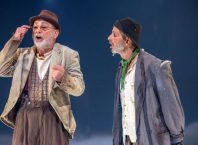
Politics and culture met on festive terms at Tmuna Theatre’s A-Genre Festival, focusing this year on occupation and The Occupation from a variety of perspectives. I like the pleasurable agitation of these events, moving around from one corner of the venue to another, talking, looking, drinking, thinking.
What struck me?
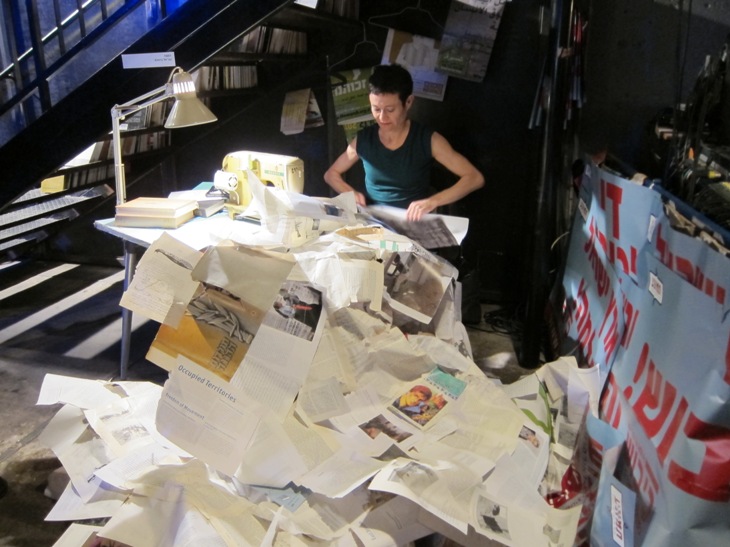
Gabrielle Neuhaus sat under the stairway, toiling away at her sewing machine, doing piece work. Tearing pages from Israeli and Palestinian history books and sewing the pieces together to create a patchwork that becomes a whole, growing larger and larger, spilling out into the room. It fascinated me to watch and was almost unbearable to see books being torn apart. Confirming with the artist that the books used were carefully collected from sidewalks and other places where they had been discarded, yet there was a small pain with each tear, perhaps a useful reminder that if we are to attempt to bring our two narratives together, we should know that it’s gonna hurt.
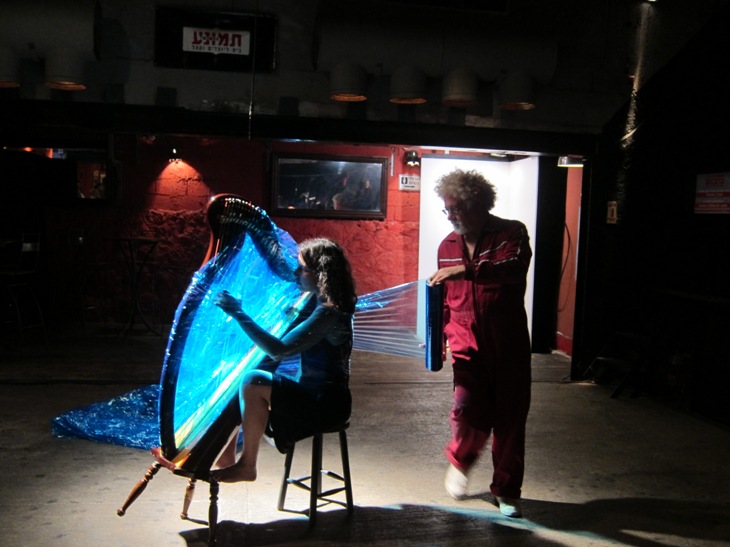
In the center of the room stood a harp, covered with blue plastic wrap, an object of mystery. During the interval between shows, we were led out to the bar area, where Adaya Godlevsky sat at the harp, playing. Uri Levinson stood by, first attacking the harp strings with plastic clothes pins, then going for a more holistic method, he began wrapping harp and harpist with blue plastic wrap, walking around and wrapping until they were imprisoned within. Perhaps the most intriguing aspect of this for me was that the process of containment did not stop the music at all, an observation that opens itself to different interpretations, depending on one’s perspective. One might say that Levinson’s activity did not harm Godlevsky’s music, the proof being that she was able to continue playing. Another way of looking at the situation was to realize that the fact that Godlevsky was still able to make music did not mean that she was not deprived of her freedom of movement. The denouement? What do you think will happen in this situation?
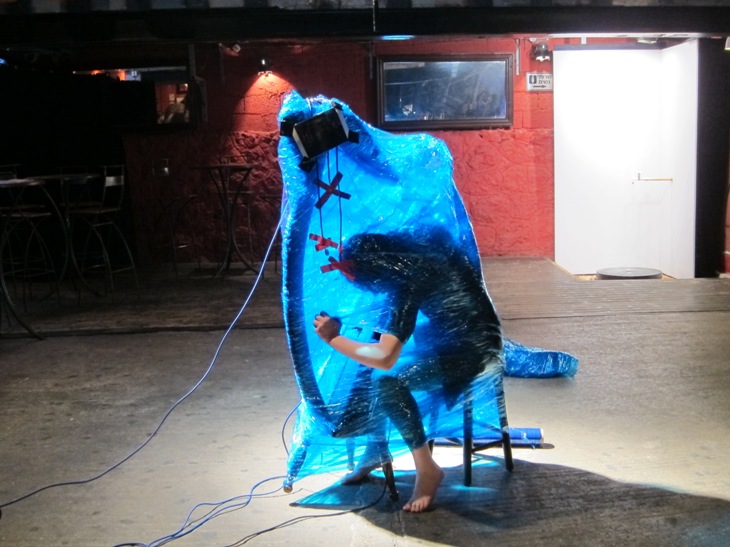
Assaf Shatil’s Occupied Territories, a work for cello quartet and electronics, is a musical meditation incorporating within it the sounds, thoughts and feelings of this state. Beautiful and moving. Performers: Dan Weinstein – cello, Karni Postel – cello, Dana Waksman – cello, Anat Nevo – Cello, Daniel Davidovsky – electronics, Assaf Shatil – composer/conductor. If you missed hearing the live performance, listen to the recording on Shatil’s bandcamp.
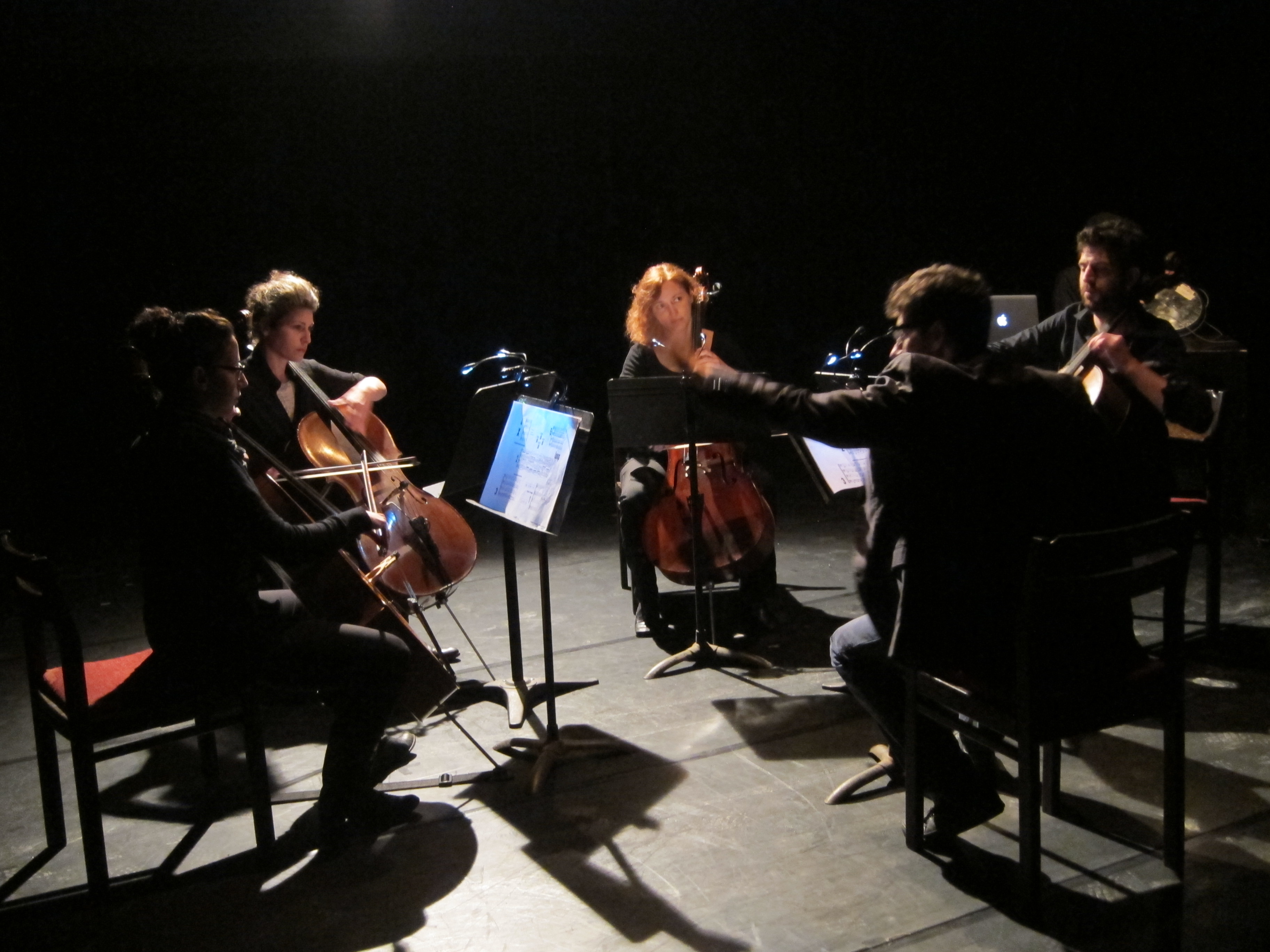
Daniel Cohen Levi has come up with an excellent solution to the security problem: ZahalD. Just as Zahal, is an acronym for Israeli Defense Forces, ZahalD is an acronym for Daniel’s Defense Forces. Surely this is the wave of the future – one’s own personal army.
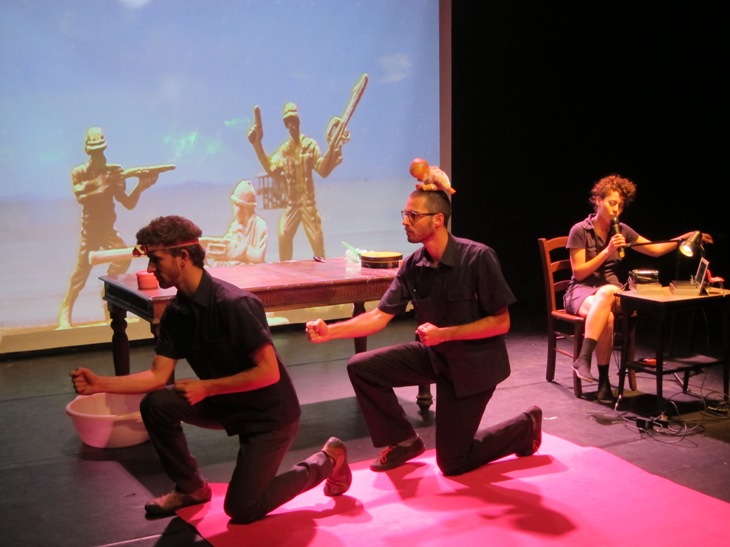
Merav Dagan and Ofir Ben Shimon made an interesting commentary on the desire to mark out territory and claim it for one’s own, connecting the political, the domestic, the personal and the more than slightly bestial, illustrated in movement and gesture.
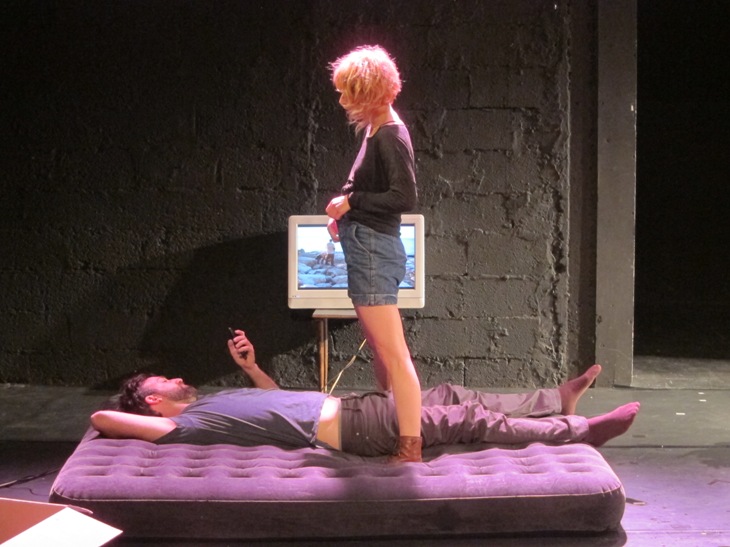
Avi Mograbi and Noam Inbar created a live mix of scenes from Mograbi’s documentary films, many filmed in the Occupied Territories, a chaotic representation of the director’s perspective on the situation, shown simultaneously on four screens. While in some ways perhaps symbolic of the situation, I found the chaotic aspect burdensome, drawn in by the images and events, call me old-fashioned but I would have preferred to focus on a single narrative or screen.
Daphna Silberg entertained and perplexed me with Torat HaZera (The Law of the Sperm), an intelligently conceived and exquisitely performed interactive theatre piece that takes a long hard look at the ethical aspect of sperm banks. Efrat Arnon, Natalie Zuckerman and Alit Kriez, dressed in body-hugging immaculate white, represent a fictional sperm bank that would give the most racist Eugenist a good run for the money. The show was hilarious, from the moment one entered the performance area and all the men were handed little plastic containers, to the not-so-rainbow lineup of men according to skin hue: from the whitest shade of pale to cafe au lait. Darker shades? Not available in the catalog.
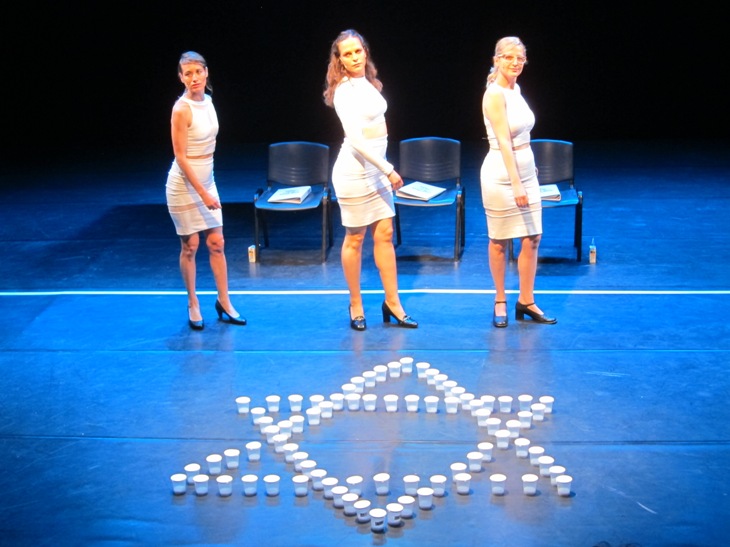
This piece raises some serious and valid questions about the policies and practices relating to artificial insemination, the ethical implications of which have not received the attention they deserve. Silberg uses this platform to expose issues of racism within Israeli culture, a racism that is all too often unacknowledged and ignored. Yet, at the same time, I am perplexed.
Silberg’s piece confuses me because it would seem to indicate that there is something essentially wrong, morally wrong about having preferences regarding one’s future as-yet-unborn child. Reading from the fictional catalog describing the sperm donors, a certain profile emerges: tall, white, intelligent, educated and in good health, with military prowess thrown in for emphasis. While this particular profile is eerily reminiscent of the good old days in pre-WWII Europe, and generally gives me the creeps, I still wonder: is it wrong to have an opinion and preference about one’s child?
Silberg’s show would seem to indicate that having a preference is inherently wrong. For example, at one point the actors read from a very long list of genetic tests that the sperm bank runs to exclude various diseases or attributes (such as dyslexia – I didn’t know you could test for that, I think this might be fictional). The accusatory tone of voice seems to suggest that testing for an inherited disease, such as Tay-Sachs, or Sickle Cell Anemia, is morally wrong. I beg to differ. If my child is born with a disease I will still love her unconditionally and do everything in my power to help her lead a happy and productive life, but would I wish my child to be healthy? Yes.
Besides, when contemplating having a child with a partner, the first step does not involve consulting a catalog, but the question of preferences is still quite relevant. If it is morally wrong for a woman who acquires sperm from a sperm bank to have preferences and make choices about the attributes of the donor, does that mean then that when choosing a romantic partner with whom to start a family the only moral option is to make that choice at random? I don’t think so…
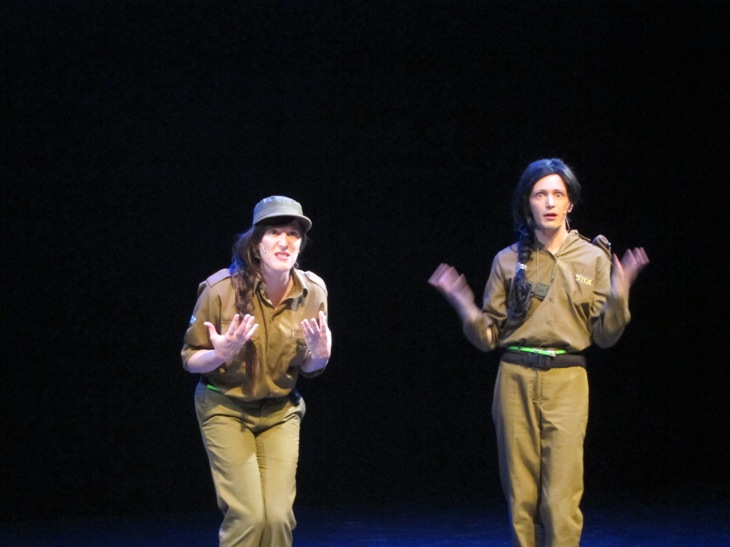
Two of my favorite girls also made an appearance at Tmuna – Girls in Arms. Jenny and Jana are devoted soldiers, dedicated to the cause of promoting military nationalist values. Nadav Bossem (Jenny) and Adili Liberman are both seriously funny actors and observers of Israeli culture. In their show they parody to perfection military and general Israeli tropes that will be hilariously familiar to most Israelis, and non-Israelis are sure to have a laugh too, even if they don’t get every single in-joke. From their new improvement on the Israeli invention of Krav-maga, called Twist-maga (inspired by the popular 60s dance), to their sharing of inspirational personal stories, they expose the irrational underbelly of blind patriotism, while giving it a tickle. Provocative and outrageous as their performance may be, it is not at all simplistic in outlook, and manages to convey the complexities of the situation with humor.

